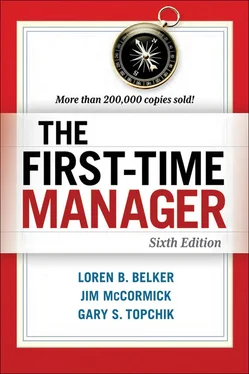If you make changes immediately, you’ll be resented. In addition to being disquieting to your team, your actions can be construed as being arrogant and an insult to your predecessor. Many young new leaders make their own lives more difficult by assuming they have to use all their newfound power immediately. The key word should be restraint . It is vital to remember that you’re the one who is on trial with your subordinates, not they with you.
This is a good time to make an important point about your own attitude. Many new managers communicate rather well upward to their superiors, but poorly downward to their direct reports, but they will have more to say about your future than your superiors. You are going to be judged by how well your team functions, so the people who now work for you are the most important in your business life. Believe it or not, they’re more important even than the president of your company. This bit of knowledge has always seemed obvious, yet many new managers spend almost all their time planning their upward communication and give only a passing glance to the people who really control their future.
Using Your New Authority
If there is one area that many new managers blunder into, it is the use of authority. This is particularly true of new managers navigating their way through a self-directed “sink or swim” method of on-the-job training. This is the flawed belief that because you now have the authority of management, you have to start using it – and you must use and display it in a big way. This may be the biggest mistake that new managers make.
View the authority of the new position as you would a limited inventory. The fewer times you draw on the inventory, the greater is the supply that remains for when it is really needed.
The newly appointed manager who starts acting like “the boss” and begins issuing orders and other directives is off to a bad start. While you may not hear the remarks directly, the typical comments made behind the back of such a misguided manager might be, “Boy, is she drunk with power,” or “This job has really gone to his head,” or “He sure is fond of himself since he was promoted.” You don’t need this kind of problem.
If you don’t draw down your inventory of authority too often, the authority you may have to use in an emergency is more effective because it is infrequently displayed. The people you lead know that you are the manager. They know that the requests you make carry the authority of your position. The vast majority of the time, it is unnecessary to use that authority.
There is a term in the creative arts called understatement . For the most part, it means that what is left unsaid may be as important as what is said. This is true with the use of authority. A direction given as a request is a managerial type of understatement. If the response is not forthcoming, you can always clarify or add a bit of authority. On the other hand, if you use all your authority to achieve a task, and then discover by the reaction that you have used too much, the damage is done. It is difficult, if not impossible, to de-escalate the overuse of authority.
In short, do not assume that you need to use the authority of your position. Perhaps the greatest by-product of this softer approach is that you are not building a negative image that may be nearly impossible to erase later.
Having the Personal Touch
Sometime during the first sixty days on the job, you should plan on having a personal conversation with each of the people in your area of responsibility. Don’t do this the first week or so. Give your people a chance to get used to the idea that you’re there. If you try to do it immediately, you risk overwhelming or intimidating your team members. When it comes time to talk, ask them into your office for an unhurried discussion about anything that is on their minds. Do no more talking than necessary. This first discussion is not designed for outward communication with your team members; it is designed to open lines of communication from them to you. (Have you ever noticed that the more you allow the other person to talk, the higher you’ll be rated as a brilliant conversationalist?)
Although the employee’s personal concerns are important, it is preferable to restrict the discussion to work-related topics. Sometimes it is difficult to define these limits because problems at home may be troubling the employee more than anything else, but at all times you must avoid getting into a situation where you’re giving personal advice. Just because you’ve been selected as the boss, it doesn’t make you an expert on all the personal problems confronting your people. Listen to them; often that’s what they need more than anything else – someone to listen to them.
Getting to Know Them
Now let’s get back to your conversation with your team members. The purpose is to give them the opportunity to open the lines of communication with you. Show a genuine interest in their concerns and learn what their ambitions are within the company. Ask questions that will get them to expand on their points of view. You can’t fake genuine interest in others; you’re doing this because you care about the employees’ well-being. Such attention is advantageous to both sides. If you can help employees achieve their goals, they’ll be more productive. What is more important is their belief that they’re making progress toward their goals.
So your goal in these early conversations is to let your team members know you care about them as individuals and you’re there to help them achieve their goals. Let them know you want to help them solve whatever problems they may be having with the job. Establish a comfort zone in which they can deal with you. Make them feel that it is perfectly natural for them to discuss small problems with you. By discussing small problems and small irritants, you can probably avoid most of the larger problems.
You’ll discover in your first few months as a manager that your technical abilities are not nearly as important as your human abilities. The majority of your problems are going to revolve around the human and not the technical aspects of the job. Unless your responsibilities are technically complex, you’ll discover that if you have outstanding human skills, you can overlook your minor technical deficiencies. Conversely, even if you are the most technically competent manager in the office, without human skills you’ll have great difficulty.
Having Friends in the Department
One of the problems many new executives confront is handling friendships with people in the department who now become their employees. This is a difficult situation to which there is no perfect answer. One of the most common questions new managers ask is, “Can I still be friends with the people who used to be my coworkers and who are now my employees?
Конец ознакомительного фрагмента.
Текст предоставлен ООО «ЛитРес».
Прочитайте эту книгу целиком, купив полную легальную версию на ЛитРес.
Безопасно оплатить книгу можно банковской картой Visa, MasterCard, Maestro, со счета мобильного телефона, с платежного терминала, в салоне МТС или Связной, через PayPal, WebMoney, Яндекс.Деньги, QIWI Кошелек, бонусными картами или другим удобным Вам способом.












